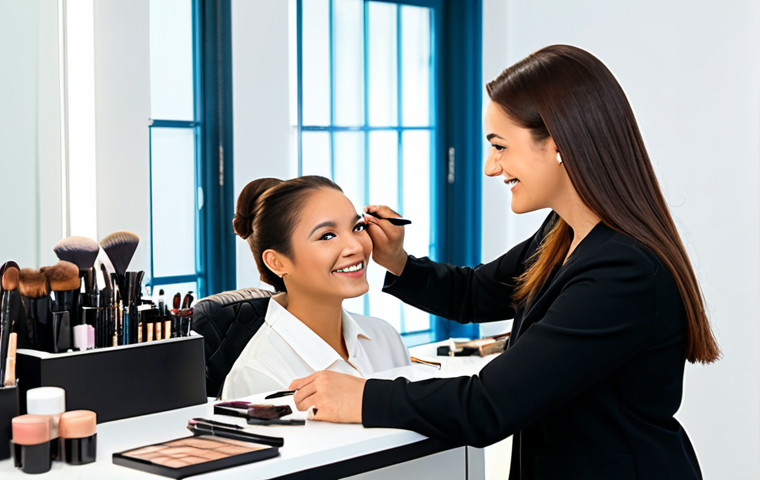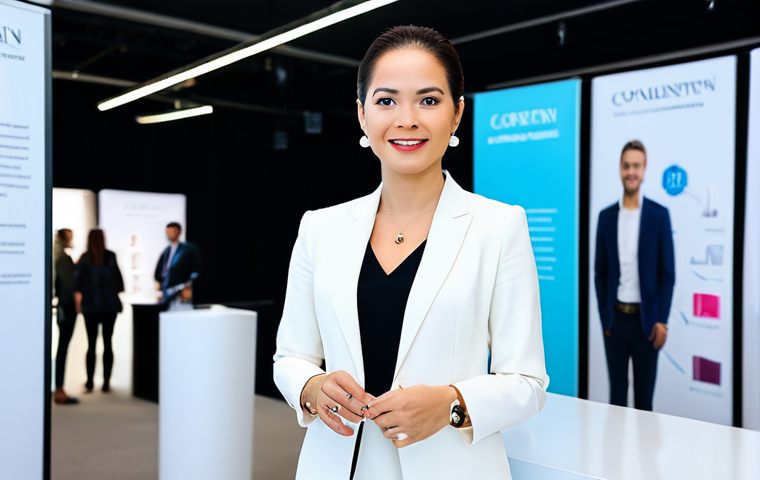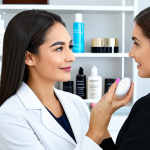So, you’re thinking about diving into the world of beauty and perhaps even snagging a beauty consultant certification? I get it! I’ve been there, scrolling through endless websites, wondering how much time it *really* takes to make it happen.
It’s a commitment, no doubt, but think of the possibilities – advising on the latest trends, building confidence in others, and even creating your own beauty empire!
From what I’ve gathered, the hours can vary wildly depending on the course and your own pace, but let’s break it all down. Let’s get a clear picture of the time investment involved.
Let’s explore it in detail in the following article.
Alright, let’s dive into it!
Figuring Out the Time Commitment: More Than Just Hours

Think of it like this: becoming a certified beauty consultant isn’t just about clocking hours. It’s about absorbing knowledge, practicing techniques, and building real confidence.
That being said, let’s break down the ways that time investment will affect your journey.
Online vs. In-Person Courses: A Matter of Lifestyle
* Flexibility is King (or Queen): Online courses are fantastic if you’re juggling a job, family, or other commitments. You can study at your own pace, fitting learning into your schedule.
I remember when I was trying to balance my full-time job with my passion for makeup. Online courses were a lifesaver. You might spend anywhere from a few weeks to several months completing a self-paced online course, dedicating a few hours each week.
* Immersive Experiences: In-person classes tend to be more structured and immersive. You’re learning alongside others, getting immediate feedback from instructors, and practicing techniques hands-on.
These courses might be shorter overall, perhaps a few days to a few weeks, but they require a more intense time commitment during that period. I took an in-person class for advanced skincare techniques, and while it was intense, the hands-on experience was invaluable.
The Hidden Hours: Practice, Practice, Practice
The course itself is just the foundation. The real learning happens when you start practicing. Think about it: learning about color theory is one thing, but actually applying it to different skin tones is another.
* Perfecting Your Craft: Set aside time to practice makeup application, skincare routines, or whatever your specialty is. Offer free makeovers to friends and family, or volunteer at local events.
I used to practice on my sister all the time (thanks, sis!). The more you practice, the more confident you’ll become, and the faster you’ll work. * Staying Up-to-Date: The beauty industry is constantly evolving, so you’ll need to dedicate time to staying current on the latest trends, products, and techniques.
This could involve reading industry publications, attending webinars, or following influencers on social media.
What Will This Cost?: Budgeting Beyond the Tuition
It’s easy to fixate on the headline cost of a course, but the true investment sprawls much further. Don’t just calculate the price tag of the program; think about the broader picture of what’s required to succeed and make a name for yourself in the beauty industry.
This includes materials, workspace, and ongoing education.
Stocking Your Arsenal: Tools of the Trade
* Quality Over Quantity: Building your kit doesn’t mean buying every single product out there. Invest in a few high-quality essentials that you can use on a variety of clients.
Think about versatile brushes, a well-curated eyeshadow palette, and a range of foundation shades. * Replenishment Matters: Keep an eye on expiry dates.
Regularly sanitise your kit and ensure that the products you use on clients are safe and effective.
Workspace Wonders: Creating Your Sanctuary
* Professionalism is Key: A dedicated workspace is essential. Whether it’s a corner in your home or a rented studio, make sure it’s clean, organized, and conducive to creativity.
* Comfort Matters: Ensure proper lighting, comfortable seating for your clients, and good ventilation. A positive and relaxing atmosphere will enhance the overall experience for everyone.
The Curriculum: What You’ll Actually Be Learning
Many people have asked me about the key areas of focus for most certification programs. Here’s a summary.
Core Competencies
These form the foundation of your beauty know-how:1. Skincare Fundamentals: Understanding skin types, conditions, and treatments. 2.
Color Theory: The principles of color mixing and application for makeup. 3. Makeup Application Techniques: Mastering various makeup looks and styles.
Advanced Techniques
Once the basics are down, you’ll probably move on to specialized techniques:1. Bridal Makeup: Creating flawless and long-lasting makeup for brides. 2.
Special Effects Makeup: Learning how to create realistic effects for film and theatre. 3. Airbrush Makeup: Applying makeup using an airbrush for a seamless finish.
Certification: A Gateway to Credibility
Getting certified can boost your career, demonstrating expertise and commitment. Potential employers and clients often look for certified professionals.
Choosing a Reputable Program
* Accreditation: Verify the program’s accreditation. A recognized accreditation ensures the program meets certain quality standards. * Curriculum: Review the curriculum to ensure it covers essential topics.
The curriculum should be comprehensive and up-to-date.
Benefits of Certification

* Increased Job Opportunities: A certification can open doors to more job opportunities in salons, spas, and retail settings. * Higher Earning Potential: Certified professionals often command higher fees for their services.
Building Your Brand: Marketing and Networking
Becoming a certified beauty consultant is just the first step. You’ll also need to market yourself and build your brand to attract clients.
Online Presence
* Social Media Savvy: Leverage social media platforms to showcase your work and connect with potential clients. * Website/Portfolio: Create a professional website or online portfolio to display your skills and experience.
Networking
* Industry Events: Attend industry events and workshops to network with other professionals. * Collaborations: Collaborate with photographers, stylists, and other beauty professionals to expand your reach.
Staying Current: Continuous Learning
The beauty industry is constantly evolving, so it’s essential to commit to continuous learning.
Trends and Techniques
* Workshops: Attend workshops and seminars to learn new trends and techniques. * Online Courses: Take online courses to stay updated on the latest products and methods.
Professional Development
* Certifications: Pursue additional certifications to specialize in specific areas of beauty. * Industry Publications: Stay informed by reading industry publications and following reputable blogs.
| Aspect | Time Commitment | Cost | Benefit |
|---|---|---|---|
| Course | Varies (weeks to months) | $500 – $5,000+ | Foundation of knowledge and skills |
| Practice | Ongoing (several hours/week) | Minimal | Refines skills and builds confidence |
| Materials | Initial setup + ongoing | $200 – $2,000+ | Essential tools for the trade |
| Marketing | Ongoing (several hours/week) | $0 – $100+/month | Attracts clients and builds brand |
| Continuous Learning | Ongoing (few hours/month) | $0 – $100+/month | Keeps skills relevant |
By understanding the time and money investments, and continually developing both hard and soft skills, beauty consultants are able to stand out in a saturated market.
Becoming a certified beauty consultant is an investment in yourself and your future. By carefully considering the time, cost, curriculum, and commitment to continuous learning, you can set yourself up for a successful and fulfilling career in the beauty industry.
Remember, it’s not just about the certificate; it’s about the passion and dedication you bring to your craft.
In Closing
So, whether you dream of working on editorial shoots, helping brides look radiant, or simply boosting people’s confidence, becoming a certified beauty consultant can open up a world of possibilities. It’s more than just applying makeup; it’s about understanding people, connecting with them, and helping them feel their best. It’s a journey of creativity, skill, and endless learning. Embrace the challenge, and you might just find yourself making a real difference in people’s lives, one brushstroke at a time. And hey, who knows? Maybe you’ll be the next big name in the beauty world!
Good-to-Know Info
1. Check reviews and testimonials of past students before enrolling in a course. This can provide valuable insights into the quality of the program and the instructor’s teaching style.
2. Look for programs that offer hands-on training and opportunities to work on real clients. Practical experience is essential for developing your skills and building confidence.
3. Consider specializing in a particular area of beauty, such as bridal makeup, special effects, or skincare. Specialization can help you stand out from the competition and attract a specific type of client.
4. Network with other beauty professionals by attending industry events and joining online communities. Networking can lead to collaborations, job opportunities, and valuable mentorships.
5. Stay informed about the latest trends and techniques by subscribing to industry publications, following beauty influencers, and attending workshops and seminars.
Key Takeaways
* Becoming a certified beauty consultant involves time for courses, practice, and continuous learning. * Costs include tuition, supplies, marketing, and ongoing education.
* Certification enhances credibility, job opportunities, and earning potential. * Marketing and networking are crucial for building your brand and attracting clients.
* Continuous learning keeps skills relevant and aligned with industry trends.
Frequently Asked Questions (FAQ) 📖
Q: How much time does it really take to complete a beauty consultant certification?
A: Okay, let’s be real – it’s not a one-size-fits-all answer. From my experience and digging around online, a beauty consultant certification can take anywhere from a few weeks to several months.
Short, intensive online courses might promise completion in 2-4 weeks, requiring perhaps 10-15 hours of study per week. However, more comprehensive programs, especially those from reputable cosmetology schools or academies, could stretch to 6 months or even a year, demanding a more serious commitment of time.
I remember one friend of mine, Sarah, took a part-time course over 9 months while working, dedicating her evenings and weekends. It really depends on the depth of the curriculum and whether it’s in-person or online, as well as your personal learning style.
Q: Are all beauty consultant certifications created equal? Should I just go for the fastest one?
A: Definitely not! I wouldn’t recommend choosing a certification solely based on speed. The content and reputation matter a lot.
You want a program that covers a broad spectrum of topics – skincare, makeup application techniques, color theory, product knowledge, even business basics like client consultation and marketing.
I’ve seen some super cheap, quick certifications that barely scratch the surface, and honestly, they don’t equip you with the skills or knowledge to confidently advise clients.
Look for certifications from established institutions or brands in the beauty industry. A well-respected certificate can open doors and give you a real edge.
Remember what happened with my cousin, Lisa? She opted for the cheaper option and ended up having to take additional courses anyway because she didn’t feel prepared.
Q: What if I already have some beauty experience? Will that shorten the time it takes to get certified?
A: Absolutely! If you’ve been playing around with makeup for years, or maybe even worked as a freelance makeup artist for events, you’ll likely find some parts of the certification process easier and faster to grasp.
You might be able to breeze through certain modules on application techniques or color matching. However, don’t skip over the fundamentals entirely! A good certification will also cover important aspects like sanitation, safety regulations, and client communication, which are crucial for professional practice.
Think of your existing experience as a head start, allowing you to focus more intensely on areas where you need to level up. Plus, your practical knowledge will make the theoretical stuff much more relatable, I think.
📚 References
Wikipedia Encyclopedia






